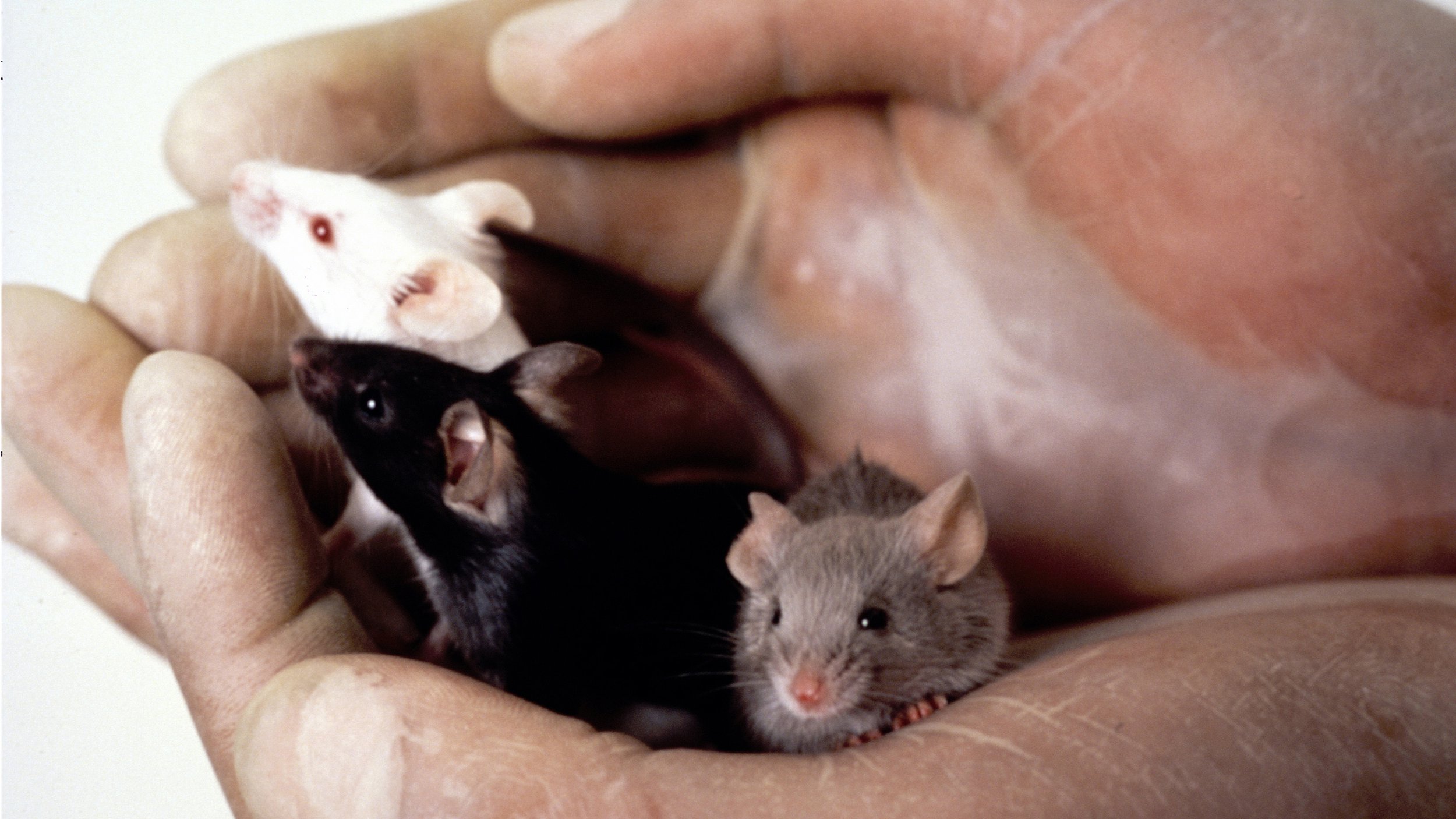These Mice Weathered Space. Here’s What Happened to Their Immune Systems.
A month of space flight might compromise the ability of mice to make disease-fighting antibodies—even after their return to Earth.

A month of space flight can take its toll on the antibody-producing cells of mice. The trip back to Earth may not be enough to repair the damage. Photo Credit: National Cancer Institute, Wikimedia Commons
Humans weren’t built for space.
The vast emptiness beyond Earth’s cozy atmosphere is an unforgiving place: Without the pull of gravity, the body can literally begin to unravel. Bones lose mass. Muscles deteriorate. Organs and blood vessels slosh and swell. And the immune system is particularly sensitive to environmental flux; astronauts experience an uptick in infections while aboard the International Space Station.
Now, scientists report that even a brief sojourn into space can discombobulate immune factors necessary to fight off disease—and the effects may persist or worsen after the return to Earth. According to a study published today in The FASEB Journal, mice ferried through space by the Bion-M1 biosatellite suffered a prolonged drop in the production of B cells, the white blood cells responsible for antibody production. If the results hold true in humans, the new research might explain some of the biggest and most lasting pitfalls of our weightless wanderings in space.
“This study is very valuable, and an important piece in this puzzle,” says Alexander Choukér, who studies space medicine at the University of Munich in Germany but did not participate in the study.
So far, only a few studies have investigated the effects of microgravity on animal bodies. Jettisoning organisms into space is no trivial feat—and the handful of humans who have made the trip are few in number, leaving many of the most pressing questions in extraterrestrial travel unanswered.
In an attempt to fill in some of these gaps, NASA and the Russian Institute of Biomedical Problems launched the Bion-M1 biosatellite—a veritable spacefaring menagerie teeming with mice, geckos, gerbils, fish, snails, and microbes––in 2013. The story quickly turned grim: During the month-long orbit, a series of equipment failures prompted the demise of all the spacecraft’s gerbils and fish, along with about two-thirds of the mice on board. When the spacecraft touched back down on Earth, the researchers found that only the geckos, snails, and 16 disgruntled mice had survived the trip.

The Bion-M1 biosatellite, contained within the Sojuz in this photo, launched in April 2013, was a veritable Noah's ark of space exploration, with gerbils, mice, fish, snails, geckos, and more aboard its capsule. Due to equipment failures, many of its passengers perished during the journey. Photo Credit: DLR photo, Wikimedia Commons
Undeterred, scientists around the world divvied up the remaining animals for further study. Several mice came into the hands of a team led by Georg Tascher, an analytical chemist at the University of Frankfurt in Germany, and Fabrice Bertile, a biologist at the Hubert Curien Multi-disciplinary Institute in France.
Curious to see how mouse immunity had fared on the final frontier, the researchers split the newly-arrived mice into two groups. The scientists analyzed the first group of mice within a day of landing on Earth, and the second after the mice had spent a week recovering—which translates to approximately a couple months for a human. (A third control group of mice was housed on Earth.) Tascher, Bertile, and their colleagues then extracted the rodents’ spleens and leg bones—including the bone marrow, where white blood cells are manufactured—and inspected their contents.
As Tascher recalls, due to the precious nature of the samples, it was a high-stakes job. “I was sweating a lot during sample preparation,” he explains. “If something goes wrong, you can’t just send the mice into space again.”
The researchers discovered that, compared to the earthbound rodents, the mice profiled immediately after orbit experienced a small dip in several immune-related proteins.
But the worst was yet to come. Even after a week under normal gravity conditions, many known protective pathways were still on the fritz, and the levels of some proteins had actually decreased further. Upon touchdown, the number of B cells in the spleens and bone marrow of wayfaring mice was mostly on par with rodents who hadn’t left Earth. Just a few days later, however, about half the cells had disappeared. The month abroad, it seems, had taken a serious toll on these antibody factories—even after re-acclimating to Earth.
“You always think, what happens to a person when they go to space? It’s a big change: There’s no gravity, and cells are working differently,” Choukér says. “But the return is a big change, too.”

A view of Earth’s horizon from the International Space Station (ISS). Many unknown variables remain in the science of space flight—but it's already clear that microgravity and radiation from the sun negatively impact health. Photo Credit: NASA's Marshall Space Flight Center, flickr
This seems in keeping with some preliminary results from NASA’s ongoing Twins Study, which is profiling the differences between identical twins Mark and Scott Kelly, the latter of whom recently spent a year living on the International Space Station. Researchers on this project have already found that while some parts of Scott’s immune system remained intact in space, several genes important for fighting off disease were expressed differently during and after space flight.
Even in mouse terms, however, a week isn’t that long. Given more time off duty, it’s possible the mice used in the study may have more or less returned to baseline. Previous studies have hinted at the resilience of human astronauts, explains Tammy Chang, a biologist and physician at the University of California, San Francisco, who was not involved in the current study. Similarly, Scott Kelly’s initial follow-up was at only six months post landing, leaving plenty of room for further developments down the line.
As things stand, most of the long-term effects of these journeys remain mysterious. Future experiments are needed to address these effects, as well as the question of how even longer odysseys in space might rejigger the road to recovery.
And proceeding with caution is essential. It’s still not clear what aspect of space flight is actually causing the immune systems of these mice to go haywire. Microgravity is sure to weigh heavy on the mind, but space travel is rife with hardship. Another problem is the high intensity of radiation from the sun, which, in space, is no longer filtered through Earth’s protective atmosphere. To make matters worse, there’s evidence that some infectious microbes don’t just survive the altered conditions of space. They thrive in it.
“There’s still a long way to go to really understand the biology of space flight,” says Rasha Hammamieh, director of the Integrative Systems Biology Program at the U.S. Army Center for Environmental Health Research. “This is just the tip of the iceberg.”

Sojuz 2.1A, which carried Bion-M1 as well as some small satellites, on its way to the launch pad, in April 2013. A Bion-M2 is already in the works, which will build on Bion-M1's findings and correct the unexpected issues that occurred during the initial trip. Photo Credit: DLR photo, Wikimedia Commons
Of course, mice aren’t humans. Any work done with these pint-sized cosmonauts needs to be taken with a grain of salt. But the perils of space make for a pretty great equalizer: Across species, space has a way of compromising the immune response, Hammamieh explains.
Scientists are already brainstorming ways to minimize the drawbacks of future expeditions. Interventions to bolster astronaut immunity could take the form of anything from gut microbiome probiotics to anti-inflammatory drugs. And plans for a Bion-M2 mission, set to launch within the next couple years, are already underway, study author Bertile explains. Some of the aforementioned countermeasures may even be put to the test on the new satellite.
Riding on the heels of unfortunate mishaps from the first endeavor, scientists are eager for a second shot at success. When the new Bion-M2 re-enters Planet Earth’s stratosphere, it will hopefully carry a capsule full of cargo that’s still alive and kicking—and full of stories to tell about the rigors of space travel.


